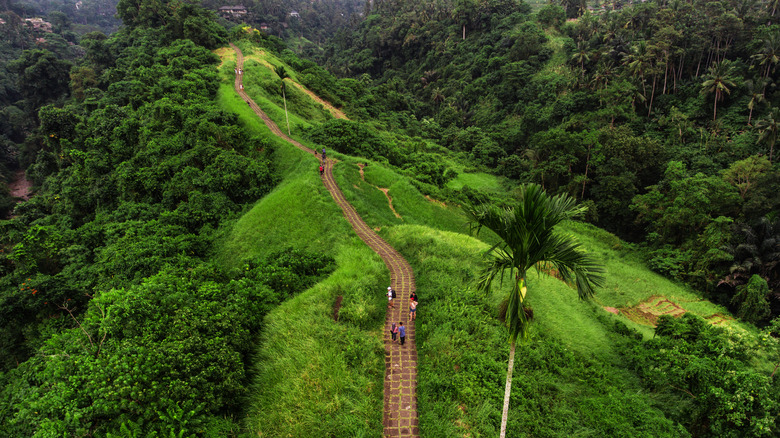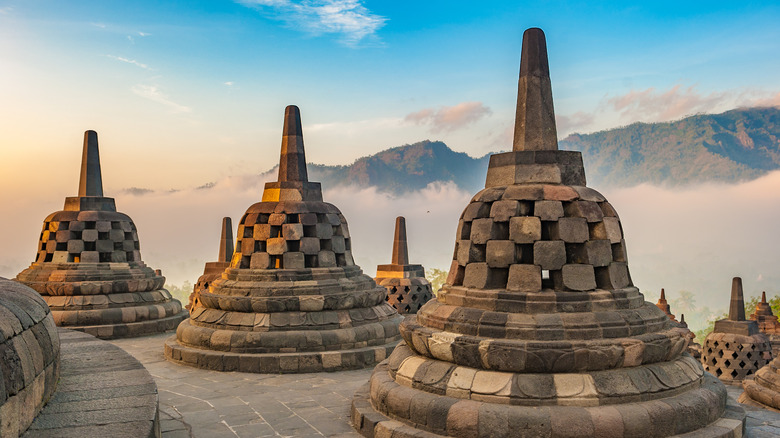Destinations Asia
Shelly Abramovich
Renowned for its enchanting volcanic landscapes, lush rice paddies, and world-class beaches, Bali, Indonesia, has long been a bucket list destination for globetrotters. Yet, the influx of tourists has downsides, especially when some visitors forget basic etiquette. Prompted by a series of incidents involving disrespectful foreign tourists, the governor of Bali, Wayan Koster, has boldly prohibited mountain hiking and climbing across the region’s 22 mountains.
This measure follows a chain of unsettling episodes, such as a German tourist disrupting a local dance performance and a Russian visitor disrespectfully posing on a sacred 700-year-old tree. Another tourist’s indecency on Mount Agung was perceived as a direct insult to the mountain’s deities. These are just a few incidents out of many, many others. There have been 130 deportations of foreigners in the first five months of 2023 alone, either for indecent behavior or visa violations.
The mountains of Bali, particularly Mount Agung, an active volcano and Bali’s highest point at nearly 10,000 feet, hold profound religious significance for the Balinese. Pura Besakih, the mother temple of Bali, is situated on its slopes. Other holy mountains include Batukao, Abang, and Batur. There are times, especially during specific religious ceremonies, when the local priests or the community need to maintain the sanctity of the mountains’ area and avoid disturbances. Any disrespect to or on the mountains is a serious offense.
Mounting concerns for Balinese locals

Dkart/Getty Images
Now, hiking up any of Bali’s 22 mountains is said to be forbidden for both foreign and domestic tourists as well as Balinese locals. The only exception to the law is religious ceremonies and handling natural disasters, such as a volcano eruption. “These mountains are sacred and revered. If their sanctity is damaged, it is the same as degrading the sacredness of Bali,” Wayan Koster stated at a news conference. The controversial decision by the Governor, reputed to be years in the making, has received mixed reviews.
The island’s economy thrives on tourism — visits to these majestic mountains are vital to many Balinese’s livelihoods. With the ban, local trekking guides face an uncertain future. “Wayan Koster has to also look out for us Balinese who work in tourism, and a strict ban will only scare tourists away — which is terrible,” a Seminyak-based guide named Che told CNN. This downturn could extend to all types of small businesses, from hotels to food stalls, highlighting the ban’s broad-reaching repercussions.
One remedy for the ban’s economic effects has been converting those currently working as mountain guides into contract workers. “We will not stop their ventures and are providing solutions,” said Bali’s tourism chief, Tjokorda Bagus Pemayun, in an attempt to assuage locals. However, the backlash has been so severe that local stakeholders — led by Anak Agung Ngurah Manik Danendra, a member of a royal household in Denpasar — are working to create a class action lawsuit against the Balinese authorities for IDR 22 trillion for the damages that could be incurred by Balinese locals and the tourism industry.
Previous Indonesian tourism policies have failed

javarman/Shutterstock
Although Governor Wayan Koster has twice reiterated his commitment to the ban, some tourists and business owners in Bali say that mountain expeditions are still ongoing and that the rule has not yet been set in stone. In a recent interview with National Geographic, the director of Bali Eco Trekking stated, “We have not seen any changes on the ground since the arbitrary rule set by the governor.”
This is not the first time Indonesian authorities have made an unexpected announcement of this kind with a questionable follow-through. In 2022, the government proposed plans to increase the entrance fee for Borobudur Temple from $12-$25 to $100 USD for foreign tourists. After a public uproar, the idea was scrapped. A similar situation happened with the Komodo National Park, with a dramatic proposal to increase the entrance fee to $250. It triggered strikes and heated protests from local tourist operators, and the plan was also rescinded. Perhaps the same might happen with this mountain climbing ban.
Bali is clearly trying to juggle a delicate balance between preserving its cultural integrity and catering to the influx of global tourism. Thankfully, there are still plenty of activities that don’t involve high altitudes. From the extreme to the serene, there is something for everyone. While Bali’s mountains are in limbo, enjoy its plentiful beaches, revel in ancient temples, or check out the Tegalalang rice fields instead. But no matter what you do, heed local customs, respect holy sites, and remember that the beauty of a place is intertwined with its values and beliefs.

